20 years of the Alfried Krupp Wissenschaftskolleg Greifswald

In January 1999, the then Lord Mayor of Greifswald, Joachim von der Wense, Professor Dr. h. c. mult. Berthold Beitz (then Chairman of the Board of Trustees of the Alfried Krupp von Bohlen und Halbach Foundation) and the Minister of Science of the State of Mecklenburg-Vorpommern, Peter Kauffold, visited the "Alte Apotheke", among other things. The half-timbered house dates back to the 15th century, is the oldest half-timbered house in Mecklenburg-Vorpommern and was to be integrated into the planned building complex.

The Alfried Krupp Kolleg Greifswald Foundation was established in 2000. The foundation took place during a press conference in the auditorium of the University of Greifswald, which was attended by Professor Dr. Jürgen Kohler (then Rector of the University of Greifswald), Professor Dr. h. c. mult. Berthold Beitz and Peter Kauffold (then Minister of Science of the State of Mecklenburg-Vorpommern) took part.
The purpose of the foundation is to promote science and research at the University of Greifswald, in particular through the operation of the Alfried Krupp Wissenschaftskolleg Greifswald. The founders include the Alfried Krupp von Bohlen und Halbach Foundation, the University of Greifswald and the state of Mecklenburg-Vorpommern.

The Kolleg begins its work on December 3, 2002. The then Minister President of Mecklenburg-Vorpommern, Harald Ringsdorf, Christina Rau, Berthold and Else Beitz and the then Lord Mayor Arthur König are present at the opening.

In 2002, the Academic Advisory Board was constituted under the chairmanship of Professor Dr. Dr. h.c. Carl Friedrich Gethmann (top row), here at a meeting in November 2004. The director of the Kolleg at the time, Professor Dr. h.c. Klaus Pinkau Ph.D. D.Sc. (4th from right) also took part in the Academic Advisory Board meetings. The Academic Advisory Board advises the Board of Trustees and the Executive Board in particular on the goals and plans of the Wissenschaftskolleg. It consists of up to twelve members who are appointed by the donors.
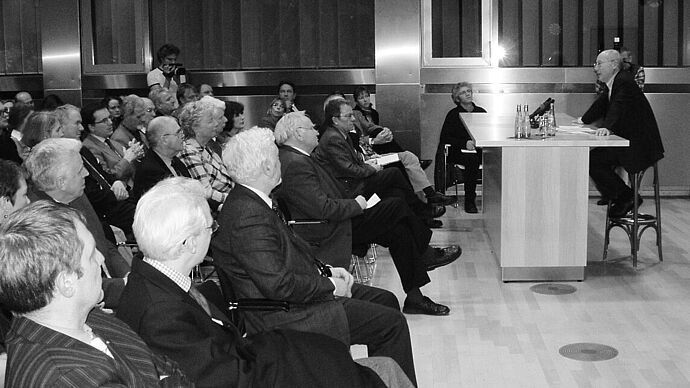
An outstanding feature of the Kolleg is its extensive lecture program, which started in 2004 and is aimed at a specialist audience as well as a broader, academically interested public with up to 100 individual events per year. The lecture program is the first of today's four pillars of the Kolleg's program. On February 24, 2005, Stefan Reinhard Aust was one of the first guests to give a lecture in a lecture hall filled to capacity.

Since 2004, the Kolleg has continued to sharpen its profile with a large number of high-calibre academic conferences, thus institutionalizing the second pillar of the programme. Together with the respective conference directors, around 20 national and international conferences, symposia and summer schools are organized with participants from all parts of Germany, Europe and the world.

The focus of the Kolleg's activities is the Alfried Krupp Fellows Program, which was launched in 2007 and has now attracted almost 200 guest researchers - the third program pillar of the Kolleg. The programme offers outstanding researchers the opportunity to realize an extensive scientific project at the Kolleg outside of their usual academic commitments. Here is the ceremonial welcome of the first Fellow cohort in 2007/08 with the then Director, Professor Dr. h.c. Klaus Pinkau Ph.D. D.Sc., can be seen here.

On October 29, 2008, Professor Dr. Berthold Beitz (8th from left) is welcomed to the Kolleg by the new Director of the Kolleg, Professor Dr. Dr. h.c. Bärbel Friedrich (6th from left) and also gets to know the 2008/2009 fellow cohort and the staff.

The Junge Kolleg Greifswald was founded in 2012 and is the fourth program pillar of the Academy as a scientific platform for scholarship holders of the Begabtenförderungswerke and the Deutschlandstipendium in Greifswald. Its main aim is to promote young academics. As an association of students from all disciplines, the Junge Kolleg enables a lively exchange through joint events and offers participants the opportunity to emphasize advanced academic research interests and develop an individual profile.
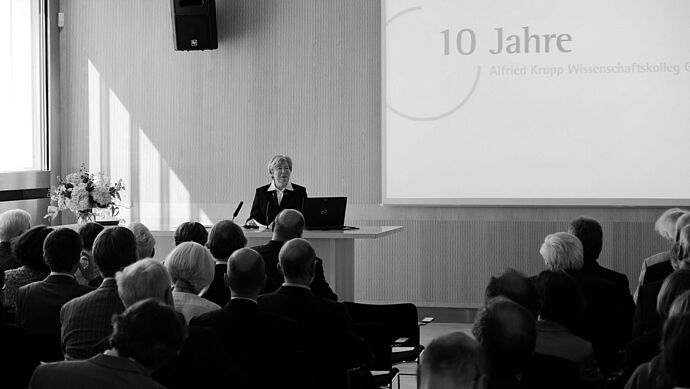
In 2013, the Kolleg celebrated its tenth anniversary in the presence of many guests from academia, business, culture and society. The director of the Kolleg at the time, Professor Dr. Dr. h.c. Bärbel Friedrich, welcomed those present and looked back.

Following the death of Professor Dr. h.c. mult. Berthold Beitz in 2013, on October 1 of the same year Professor Dr. Dr. h.c. Ursula Gather took over as Chair of the Board of Trustees of the Alfried Krupp Kolleg Greifswald Foundation. As Chairwoman of the Board of Trustees of the Alfried Krupp von Bohlen und Halbach Foundation in Essen, she is a natural member of the Board of Trustees.

Many events in the medical area of the Kolleg offer students and professionals an intensive learning environment to explore and deepen current topics and developments. Innovative approaches and modern technologies are often presented at lecture series and specialist conferences, such as the use of humanoid robots in therapy, which was demonstrated during the Neurorehabilitation Summer School 2014.

The summer schools "Ukrainicum" (since 2005), "Polonicum" (since 2011) and "Bohemicum" (since 2019) are outstanding events in the Kolleg's conference program. The "Ukrainicum", which took place for the 27th time in 2023, offers specialist seminars and intensive Ukrainian language courses at various levels, supplemented by lectures and seminars. The "Polonicum", which invites renowned researchers, focuses on literary and cultural studies topics. Scholarships for international students and doctoral candidates promote a multi-perspective academic exchange. The "Bohemicum", which takes place every year alternately with the "Polonicum", enables students and doctoral candidates to explore the Czech language as well as the science, literature and culture of the Czech Republic in depth. The Kolleg has also supported the Polish cultural festival polenmARkT since 2010. In addition, public lectures and speeches, conferences and workshops offer the opportunity to engage with current topics relating to Central and Eastern Europe.

On April 9, 2015, to mark the 100th anniversary of the death of the physician, microbiologist and founder of virology Friedrich Loeffler, Professor Dr. h.c. Bärbel Friedrich, together with the then President of the Friedrich Loeffler Institute, Professor Dr. Dr. h.c. Thomas C. Mettenleiter (4th from left), welcomed a Nobel Prize winner to the Kolleg, again. Professor em. Dr. Dr. h.c. mult. Harald zur Hausen (1st from left) gave the 4th "Loeffler Lecture" and spoke about meat and dairy products from cows as risk factors for cancer and neurological diseases. In honour of Friedrich Loeffler, Professor Dr. Dr. h. c. mult. Marian Horzinek (3rd from left) presents Loeffler's outstanding scientific achievements.
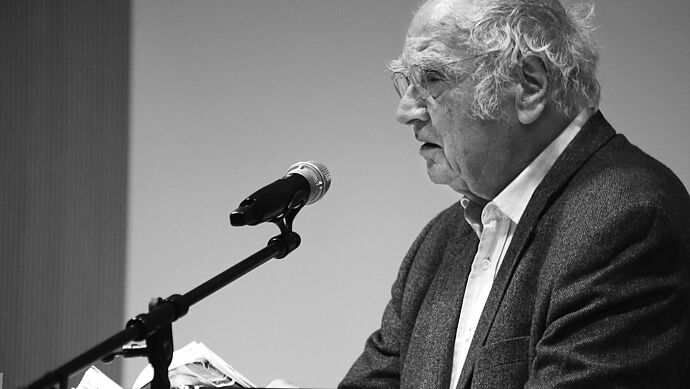
Martin Walser read from his diaries from 1979 to 1981 at the Kolleg in 2015. He reflected on the importance of writing, emphasizing that it gives meaning to life and creates true beauty. Walser also provided fascinating insights into his experiences, his writing and his encounters with personalities such as Jürgen Habermas, Thomas Bernhard and Günter Grass.

The research group also focuses on the fields of medicine, biosciences as well as environmental, climate and energy research. This is done in close cooperation with the Max Planck Institute for Plasma Physics, the Friedrich Loeffler Institute, the Faculty of Mathematics and Natural Sciences at the University of Greifswald and the University Medical Center Greifswald. Professor Dr. Christian Drosten (then University of Bonn) spoke at the Kolleg back in 2013, here on his second visit in 2016 as part of the "Planet Earth 3.0" lecture series.

The Board of Trustees of the Alfried Krupp Kolleg Greifswald Foundation, chaired by Professor Dr. Dr. h.c. Ursula Gather (1st from left) appointed Professor Dr. Ulla Bonas (2nd from left) as the new Academic Director of the Kolleg on October 1, 2018. At the farewell ceremony for Professor Dr. Dr. h.c. Bärbel Friedrich (3rd from left) was also attended by Professor Dr. Johanna Eleonore Weber (4th from left), who always supported the Kolleg during her term of office from 2013 to 2020.
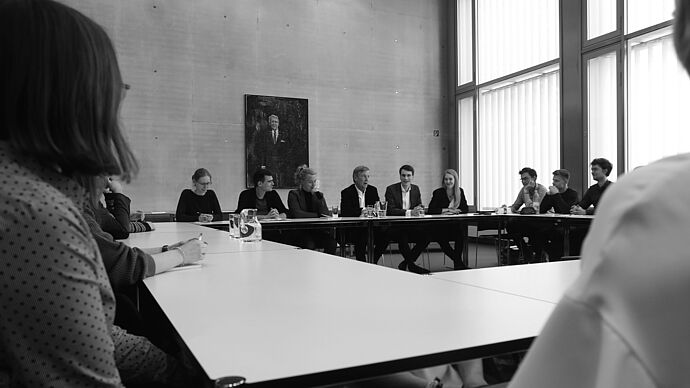
The Junge Kolleg is increasingly consolidating its position as an academic forum for scholarship holders of the Begabtenförderungswerke and the Deutschlandstipendium in Greifswald. On April 9, 2019, presenter Claus Kleber spoke exclusively with the members of the Junge Kolleg about the journalistic approach in a public service context.

The Kolleg has established various speeches, including the Greifswald Speech, in which numerous nationally and internationally renowned speakers report on their research areas. A new format was introduced in 2020: the Leibniz Prize Laureate Speech. The first speech was given by Professor Dr. Dr. h.c. Barbara Stollberg-Rilinger (University of Münster/Wissenschaftskolleg zu Berlin). These speeches serve as an open forum and are aimed at a broad audience.

During the coronavirus pandemic, the technical equipment was quickly upgraded so that digital formats could be implemented quickly. Even today, numerous events continue to take place in hybrid form, which has led to a broader audience base and improved accessibility. In addition, many events are also offered as recordings in the media library.

Since the beginning of the Russian war of aggression in February 2022, over 500,000 Ukrainians have fled to Germany, including some to Greifswald. Both the University of Greifswald and the Alfried Krupp Wissenschaftskolleg felt obliged to support these people due to their focus on Eastern Europe. At a panel discussion in which Professor Dr. Roman Dubasevych, Professor Dr. Yuliana Lavrysh, Fellow and Professor Dr. Natalia Kudriavtseva as well as the Rector of the University of Greifswald, Professor Dr. Kathrin Riedel, took part, the possibilities of academic solidarity in times of crisis were discussed. The Alfried Krupp Wissenschaftskolleg Greifswald quickly set up the possibility of awarding short-term fellowships to Ukrainian researchers, allowing family members of the researchers to travel to Greifswald and live at the Kolleg.

Since 2007, around ten to twelve researchers have worked as fellows at the Kolleg each year, almost 200 guest researchers in total. Many remain connected to the Kolleg after their stay through the alumni initiative. In 2022, Fellows Professor Dr. Dörte Schmidt, Privatdozent Dr. Kyung-Ho Cha, Dr. Sarah Hegenbart and Professor Dr. Gideon Reuveni discussed the future of the German-Jewish past, in particular the impact of Germany's recognition of Holocaust responsibility on relations with Israel and the fight against anti-Semitism in Germany, at the annual alumni meeting in June.
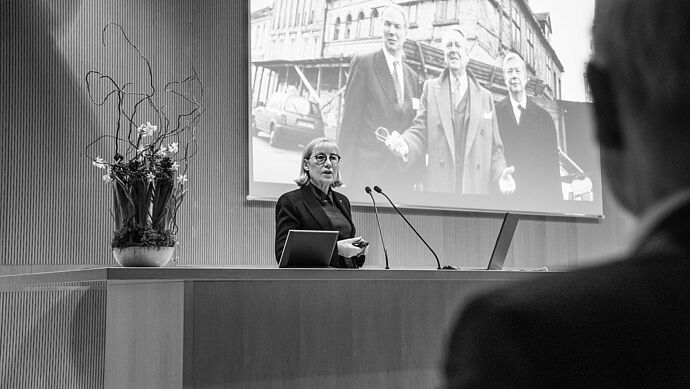
The Alfried Krupp Wissenschaftskolleg Greifswald celebrated its 20th anniversary with a two-day colloquium. Renowned personalities from science, politics, culture and society were invited to the Kolleg for the event on March 16 and 17, 2023. Speakers included the Rector of the University of Greifswald, Professor Dr. Katharina Riedel, the Mayor of Greifswald, Dr. Stefan Fassbinder, and representatives of the state government. The keynote speech on 16 March 2023 was given by the Chairwoman of the Board of Trustees of the Alfried Krupp von Bohlen und Halbach Foundation, Essen, and the Board of Trustees of the Alfried Krupp Kolleg Greifswald Foundation, Professor Dr. Dr. h.c. Ursula Gather.

The Interdisziplinäre Forschungszentrum Ostseeraum (IFZO) at the University of Greifswald promotes research, transfer and cooperation in the Baltic Sea region and is also supported by the Kolleg. Innovative projects are developed through interdisciplinary cooperation between the humanities, social sciences, natural sciences, theology and medicine. In addition to the IFZO joint research project "Fragmented Transformations. Perceptions, Constructions, Constitutions of a Region in Transition", the International DFG Research Training Group "Baltic Peripeties. Narrative of Reformations, Revolutions, Catastrophes" and the Herrenhauszentrum des Ostseeraums. The interdisciplinary working groups are regular guests at the Kolleg in order to exchange ideas with colleagues from all the countries bordering the Baltic Sea.

The Board of Trustees of the Alfried Krupp Kolleg Greifswald Foundation, chaired by Professor Dr. Dr. h.c. Ursula Gather, has unanimously appointed Professor Dr. Thomas Klinger, Scientific Member of the Max Planck Institute for Plasma Physics in Greifswald, as the new Scientific Director of the Alfried Krupp Wissenschaftskolleg Greifswald as of October 1, 2023. In his inaugural speech on April 8, 2024, he presented his visions for the further development of the Kolleg.

The Felix Hausdorff Lectures, organized in cooperation with the Institute of Mathematics and Computer Science at the University of Greifswald, aim to bring mathematical phenomena and problems closer to a broad audience. Felix Hausdorff (1868-1942), known as a co-founder of general topology and for his contributions to set theory, functional analysis and algebra, was appointed to Greifswald in 1913 and completed his work "Grundzüge der Mengenlehre" here. In 2024, Professor Dr. Sarah Zerbes spoke about "The Secrets of Numbers" to a full lecture hall as part of the Felix Hausdorff Lectures.
